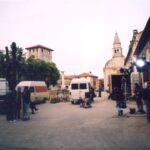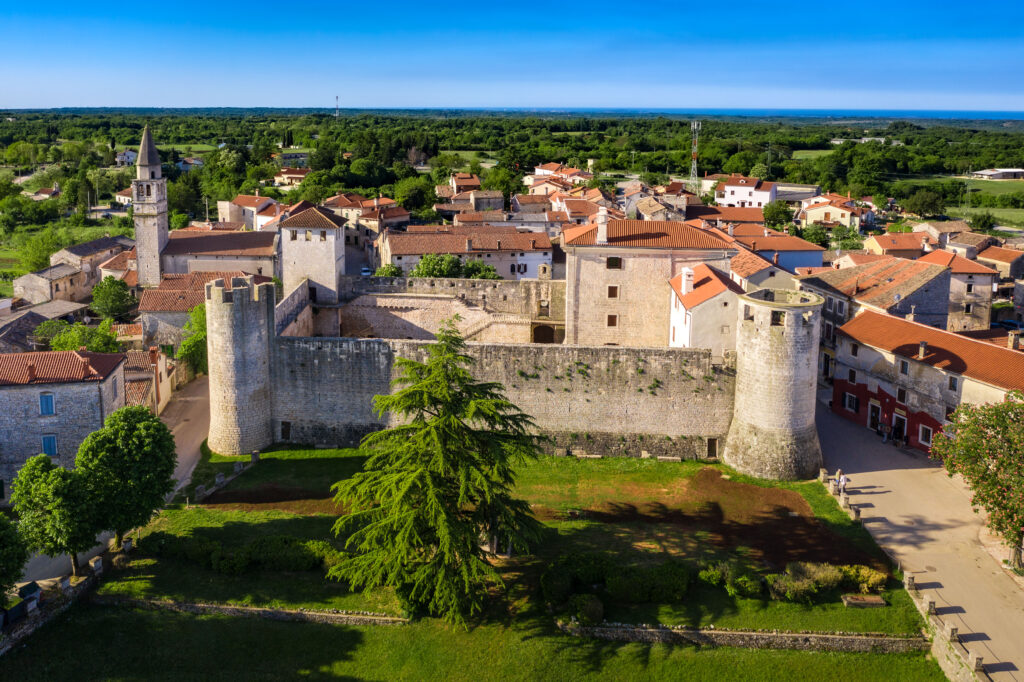
Synopsis
“Maršal”, directed by Vinko Brešan based on a script written by Vinko Brešan and his father Ivo, is a satirical comedy set on a small Dalmatian island. The story follows a policeman Stipan who arrives to the island to solve mysterious events. Allegedly, on a funeral of a local communist, the ghost of Josip Broz Tito appeared. Pensioners and national liberation war fighters, led by Marinko Čičin, take advantage of this phenomenon to initiate the “socialistic and spiritualistic tourism” and attract tourists. The film explores the topics of nostalgia, exploitation of ideology and religious folklore elements in the spirit of the criticism of capitalistic instrumentalization of history. When it comes to domestic audience, “Maršal” reached over 100,000 viewers and won the Golden Arena in Pula, together with numerous international awards, including those in Berlin and Karlovy Vary.
details
Original title: Maršal
Also known as: Marshal Tito’s Spirit
Year: 1999
Country of production: Croatia
Production: Hrvatska radiotelevizija (HRT), Interfilm
Genre: comedy, satire
Directed by: Vinko Brešan
Starring: Dražen Kuhn, Linda Begonja, Ilija Ivezić, Ivo Gregurević, Boris Buzančić, Bojan Navojec, Predrag Vušević, Ksenija Pajić
Filming locations in Istria: Svetvinčenat
Other locations: Osor (Cres)
REVIEW
MARŠAL, directed by Vinko Brešan, 1999
PROTECT THE BROTHERHOOD AND UNITY LIKE THE PUPIL OF YOUR EYE
The second feature film by a Croatian director and screenwriter Vinko Brešan, shot in 1999, which he made together with his father Ivo Brešan, deals with the legendary persona of Yugoslavian and world history, Josip Broz Tito and his popularity and status after the Croatian war for independence with a typical Brešan-like recognizable combination of mockery and nostalgia. In Croatia, more than 100,000 viewers saw the film, and at the 2000 Pula Film Festival, it received the Big Golden Arena. It also received numerous international awards, including at the festivals in Berlin and Karlovy Vary.
“Maršal” is set on a Dalmatian island, a forgotten piece of rock in the middle of the Adriatic Sea. A group of old former fighters, members of the Federation of the Association of Veterans of the National Liberation War of Yugoslavia, formerly fully decorated, but now struggling with small pensions, come to the island to bury one of their comrade fighters. On the funeral, they saw and experienced something they refuse to talk aloud, while rumours start to circle that there is a ghost of Josip Broz Tito around. A young police officer Stipan is assigned to come to the island, investigate the situation and calm the people down, and the most important thing is not to make a fuss about it because the fuss, in cases like this, can turn into a scandal.
In a reconstructed hotel, formerly headquarters of a local communist committee, and now with false palm trees and a tourist offer for the elderly, a former commissar Marinko convenes a conspiratorial meeting with old comrades. So, on this desolate place, between reality and oblivion, where the time has stopped, a tragicomic partisan eschatology unfolds: the past returns, but as a phantom, not as a hero. The mayor and a local tycoon Luka, despite his reputation as an anti-communist, seeing this as an opportunity for quick profit, promptly organizes Titoist events on the island, intended to attract communist pilgrims and launch political tourism. However, Marinko and his comrades have more serious intentions - a new people’s revolution and the seizure of power.
When it comes to Brešan, everything is part of the same circle in which no one is a saint and no one will be spared: the past cannot die, the present fails to come to life, and as for the future, nobody knows where it is or where it is going. In this people’s tragicomedy, the sarcasm is the final form of moral hygiene. On the one hand, old folks in their partisan uniforms, physically weak, but rhetorically unyielding, live in the mythology of their own credits, which resembles an old people’s home of ideology. On the other hand, today’s masters of reality, tycoons, political defectors, and patriotic hypocrites with privatization portfolios under the banner of anti-communism, an ulterior motive and a tie around their neck, blandly devastate acquired social achievements, exploiting social weaknesses for personal gain. The future is embodied by a drugged, apathetic, crippled and ideologically beheaded youth.
This combination of situation and character comedy is a harmonious blend of humour, satire, and mockery, which, especially for the time when it was created, demonstrates incredible courage in coming forward and strongly provoking everyone. The ingenious screenwriting achievements include numerous elements of human stupidity, ideological aspirations, tradition, heritage, nostalgic recollections of past events and life habits, as well as songs and folk customs. The story also deals with the religious phenomenon of apparitions in a satirical manner, balancing between the mysticism of the apparitions and the communist ideals of the cult of personality. Certain similarities with Brešan’s feature début “Kako je počeo rat na mom otoku” (for which the screenwriters were also Vinko and Ivo Brešan) are very obvious, including the setting (an island).
In order to know the deeper context, where there is one all in this conglomerate, as well as to understand a large part of the situations, especially today, more than 25 years since the end of the Croatian war of independence and more than forty years since the death of Comrade Tito, it is necessary to know the communist and post-communist context of Croatia and Yugoslavia, but also the broader area of general culture, information and television. The parodies are multiple, but not all of them are equally funny (for example an investigator duo “Mulderich” and “Skullich” from the UNS, who is both funny and redundant, but its silliness as such was used enough in the scenario).
Brešan’s directing concept is more mature than in “Kako je počeo rat na mom otoku”, the characters are better nuanced and the narrative was superbly constructed as a development line of a colourful group of characters, which are largely stereotypical, but nevertheless, their interactions and relationships are still well established. With the frequent use of low angles, emphasized physical humour, stage movement, and skilful use of shouts and socialist slogans, the film flows pleasantly, without losing its rhythm. The film finale is both forced and perfect for this type of mockery, especially in the context of the time when it was made. In 2011, the opera by “Maršal” by Silvio Foretić was made.








